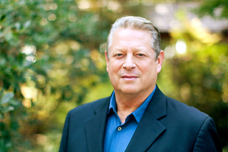Gore Warns About Global Warming In Class Day Address to Graduates

 Keeping with the lighthearted atmosphere of Class Day, the part of Princeton University’s Commencement exercises planned by graduating seniors, former Vice President Al Gore cracked a few jokes before getting down to the serious business of climate change during his speech to the class on Monday morning.
Keeping with the lighthearted atmosphere of Class Day, the part of Princeton University’s Commencement exercises planned by graduating seniors, former Vice President Al Gore cracked a few jokes before getting down to the serious business of climate change during his speech to the class on Monday morning.
“I was once voted the funniest man on C-Span,” joked Mr. Gore, who has often been criticized for his stern demeanor. Telling graduates he sympathizes with them about grade deflation at Princeton University, he said, “Heck, I won the presidential election and I got second place.”
But Mr. Gore, whom the students selected as their keynote speaker, soon switched focus to environmental activism, the issue he has championed since losing that election in 2000. He praised the announcement by the Obama administration on Monday that the federal government will propose regulations cutting carbon pollution from power plants by 30 percent from 2005 levels by 2030.
“But today, something else happened that has not been as noticed,” he added. “We as a human civilization have put another 98 million tons of globe-warming pollution into the atmosphere surrounding our planet, as if it is an open sewer. That pollution is trapping a lot of heat, as much in 24 hours as would be released by 400,000 Hiroshima-class atomic bombs every day. It is raising temperatures, giving the earth a fever, and putting more water vapor into the air.”
Citing severe droughts in California, Mr. Gore said special interest groups are confusing people by spreading misinformation. He described the power plant industry as “doing exactly what the tobacco industry did 40 years ago,” hiring actors to assure the public that cigarette smoking was not hazardous to health.
But the good news, he said, is that in 79 countries, the cost of solar electricity is equal to or less than the cost from other sources. “This is truly a revolution in the making,” he said. “This revolution is unstoppable. But we are in a race, and we need to accelerate the pace. I want to urge you to be a part of that race.”
Mr. Gore recommended that the University not invest in stocks for carbon-intensive companies. He compared the changing of attitudes toward environmental issues with changes he saw in his youth in thoughts about racism. “We’re winning that conversation,” he said. “But we’ve got a ways to go. We’ve got everything we need. The will to act is itself a renewable resource.”
Urging students to be pro-active, he said those who attend the University in future decades will look back on the current era and ask one of two questions. “If they are struggling with the kinds of horrific consequences scientists have been warning about, they will ask, ‘What were you thinking? Why didn’t you act?’”
But if changes have been made to create “a low carbon world,” he continued, people will look back and ask, “How did you shake off the lethargy and find the moral courage to rise up and make the changes that were so essential?”

